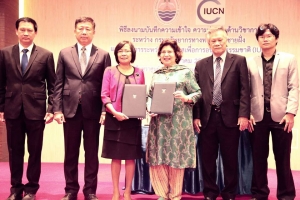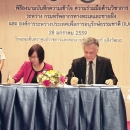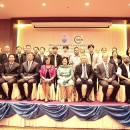Coastal ecosystems to benefit from cooperation between DMCR and IUCN
Location: Bangkok, Thailand. 29th Jan 2016
Thailand’s coastal resources are extremely important both in terms of biodiversity and economic activity, with tourism and fisheries contributing significantly to provincial and national economic development. Mangrove forests, in particular, are exceptional ecosystems, playing multifunctional roles such as purification of water and provision of food while also acting as buffers against storm surges.
Unfortunately, threats such as climate change, degradation, overexploitation, and unsustainable development-related activities like shrimp farming have severely affected the health of marine ecosystems, threatening the livelihoods of communities living in coastal areas.
“Thailand has a very rich natural heritage, but over the past four decades, rapid economic growth has given rise to a series of environmental challenges, including the loss and degradation of coastal habitats including mangroves, seagrasses and coral reefs,” said Ms. Aban Marker Kabraji, Regional Director for IUCN Asia. “Partnerships like this one are very important in addressing these issues. In particular, we are very pleased to see the new action from the government on the active conservation of marine and coastal resources, with the adoption of the new Marine and Coastal Resource Management act, which IUCN provided support to develop, and with the enactment of the new Fisheries Law.”
DMCR and IUCN have been partners in conservation since 2002, working on numerous projects, including Mangroves for the Future (MFF), Mangrove and Markets (MAM), Ecosystems Protecting Infrastructure and Communities (EPIC) and the Transboundary Dolphin Conservation project.
This new MOU specifically seeks to enhance and strengthen coastal community participation in marine and coastal resource management. This includes the development of conservation schemes for dolphins, coral reefs and mangrove forests in demonstration sites. Lessons learned and outputs in the demonstration sites will be replicated in other areas in Thailand, with plans to also scale up collaboration with neighbouring countries.
DMCR and IUCN are currently working on finalizing a framework response for coral bleaching management. This is in response to a global coral bleaching event, which is expected to impact approximately 38% of the world’s coral reefs and kill over 12,000 square kilometres of reefs from 2015 to 2016.
“The coral bleaching response plan will define a set of pre-determined actions to be taken in response to bleaching-related events,” said Ms. Suthiluck Raviwan, Director-General for DMCR. “It represents an urgent need for collaboration between government, non-governmental agencies and concerned stakeholders to take immediate actions to improve reef ecosystem resilience.”
Held at the Centra Government Complex Hotel and Convention Centre Chang Wattana, the signing ceremony was attended by over 60 representatives of government agencies, civil society organizations, private sector and the media. The MOU was signed by Ms. Suthiluck Raviwan, Director General for DMCR and Dr. Chamniern Vorratnchaiphan, Country Representative for IUCN Thailand, with Mr. Sakda Wichiansin, Deputy Director-General for DMCR, Ms. Aban Marker Kabraji, Regional Director for IUCN Asia, Dr. Pinsak Suraswadi, Director of Marine and Coastal Resources and Development Institute and Mr. Petch Manopawitr, Deputy for IUCN Southeast Asia Group, acting as witnesses.



